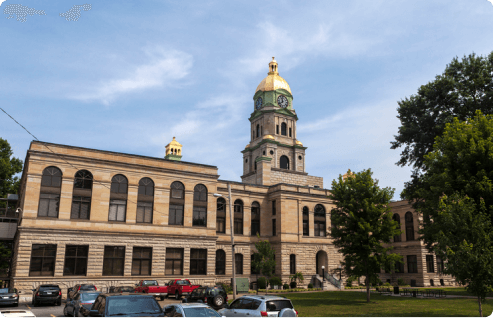
- $8.5 Billion Recovered
- Serves Clients Nationwide
- Rated #1 by U.S. News & World Report for 2022
West Virginia’s mining, manufacturing and industrial sectors exposed workers to a wide range of asbestos-containing products. This led to high rates of asbestos-related diseases, making the state a hot spot for mesothelioma lawsuits.

Finding the right mesothelioma lawyer involves seeking someone with experience in West Virginia asbestos cases and a proven track record of successful outcomes. Begin by checking how many mesothelioma cases the attorney has handled and their success in securing compensation. Look for law firms that understand West Virginia’s laws and the local court system. It’s also important to choose a lawyer who offers clear communication, compassionate support and no upfront fees, so you can focus on your health while they pursue your case.
West Virginia is a top state for asbestos exposure and mesothelioma claims, with Kanawha County ranked No. 9 in the nation for asbestos lawsuit filings and No. 7 for asbestos-related lung cancer filings, according to KCIC. This high volume reflects the state’s heavy industrial history and widespread asbestos use in workplaces like coal mines, power plants and manufacturing facilities. West Virginia’s asbestos history underscores the urgent need for residents to select only experienced attorneys to handle their cases.
Many respected law firms serve West Virginia clients, including nationwide firms that regularly meet with residents. Firms such as Simmons Hanly Conroy and Weitz & Luxenberg have helped families win significant settlements and verdicts. These firms bring the resources needed to handle complex cases and protect your rights, no matter where you live in the state. Local attorneys are familiar with West Virginia’s specific laws and court procedures, including the 2-year deadline to file claims after diagnosis or a loved one’s passing. Your lawyer will guide you through filing a personal injury lawsuit, wrongful death claim or asbestos trust fund claim.



The following verdicts represent some of the highest verdicts awarded to mesothelioma plaintiffs in West Virginia courts. However, most mesothelioma claims are settled before trial. In February 2024, a total of 40 asbestos cases consolidated in a West Virginia circuit court settled days before the scheduled trial.
According to a 2024 KCIC report, Kanawha had the most defendants named on asbestos complaints, with an average of 175 defendants for each lawsuit. For comparison, it had 156 defendants per lawsuit in 2023.
Notable Asbestos Settlements and Verdicts
Generally, out-of-court settlement amounts are less than verdict awards, and they’re kept confidential. Experienced asbestos lawyers are known to secure mesothelioma settlements worth more than $1 million for their clients.
They’re also known to recover 6-figure mesothelioma compensation from asbestos trust funds. A West Virginia mesothelioma attorney can help you file both types of claims in the state without violating laws that promote transparency in asbestos litigation.

Get help finding an attorney who knows the process and can get you and your family the compensation you deserve.
Get Help NowYour West Virginia mesothelioma lawyer navigates the state’s detailed disclosure requirements and evidence standards. West Virginia’s Asbestos and Silica Claims Priorities Act, passed in 2021, requires detailed medical reports and sworn disclosure forms, and your lawyer ensures all documentation meets these strict requirements to prevent claim dismissal.
Steps to a Mesothelioma Claim
Your lawyer will also assess if you’re eligible to file claims with asbestos trust funds. West Virginia’s Asbestos Bankruptcy Trust Claims Transparency Act requires plaintiffs to disclose any trust claims to prevent duplicate recoveries. Your lawyer manages these complex disclosure requirements across multiple trust funds and coordinates claims to maximize your total compensation.
Building a strong case in West Virginia also requires careful documentation of fault. House Bill 2002, effective in 2015, replaced joint liability with proportional fault allocation, meaning your attorney must document each defendant’s specific responsibility for your exposure. Throughout the process, your lawyer keeps you informed and handles all legal details while pursuing compensation that covers medical bills, lost income and other losses.
Often, asbestos exposure in West Virginia happens through contaminated products in workplaces. Residents who worked in construction, power generation, logging, mining, coal refineries and manufacturing were at risk of asbestos exposure on the job.
Asbestos building materials in schools have also presented a risk for decades. In 2017, abating asbestos paint was the last step required before opening Ceredo-Kenova Elementary School. In 2011, contractors found asbestos under the floor tiles in Clay County’s Lizemore Elementary School. The 59-year-old school received an inspection in the 1980s. Workers covered over asbestos rather than removing it.
Sites Known for Asbestos Exposure
With 117 coal seams in West Virginia, the state’s most notable asbestos threat was its mining industry. Asbestos products on mining equipment posed the most significant threat. Brake linings, welding blankets, pipe insulation and transit panels from mines contained asbestos.
Kanawha County, Cabell County and Putnam County have had the highest incidences of asbestos deaths for decades. These counties were home to some of the state’s most prosperous coal mines.
Weirton Steel in West Virginia was a major steel mill where many workers were exposed to asbestos used for insulating boilers, furnaces and machinery. Asbestos fibers became airborne during equipment maintenance and repair, putting workers at risk for diseases like mesothelioma and lung cancer. Employees in various roles, including pipefitters, boilermakers and maintenance crews, faced significant exposure over decades. The toxic asbestos dust also contaminated protective clothing, increasing risks even outside work areas. Despite regulations later limiting asbestos use, the health impact on Weirton Steel workers remains a serious concern, with many filing lawsuits for asbestos-related illnesses linked to their employment at the mill.
Most asbestos exposure in West Virginia has been occupational exposure. Workers in West Virginia have been exposed in coal mines, refineries, manufacturing plants, chemical plants and power generation.
Veterans experienced military exposure on bases in West Virginia as well. Many workers who used asbestos products unknowingly brought asbestos fibers home, which led to secondary asbestos exposure among family members.
Jobs That Exposed Workers to Asbestos
Union Carbide owned many West Virginia mines. Many workers have filed lawsuits against the company in connection with asbestos exposure. West Virginians also sued Norfolk Southern Railway and Gordon Gasket and Packing over asbestos exposure.
West Virginia’s asbestos litigation is dynamic, with recent court orders and legislation influencing how cases are handled. Skilled lawyers stay ahead of these changes to protect your claim. They track updated deadlines, manage evolving evidence rules and adapt filing strategies to meet new court requirements.
West Virginia Legislative Changes
Your lawyer monitors all these developments, ensuring your claim meets legal standards. They negotiate effectively with defendants and advocate vigorously in court to maximize your compensation. With their support, you can face the complexities of asbestos litigation in West Virginia with confidence.
Recommended ReadingStay up-to-date on treatment, research, clinical trials, doctors and survivors
The information on this website is proprietary and protected. It is not a substitute for professional medical advice, diagnosis or treatment. Any unauthorized or illegal use, copying or dissemination will be prosecuted. Please read our privacy policy and terms of service for more information about our website.
This website and its content may be deemed attorney advertising. Prior results do not predict a similar outcome.
The Mesothelioma Center’s claim as the most trusted resource is based on our more than 150 5-star Google and BBB reviews. Our organization also helps more than half of all mesothelioma patients annually diagnosed.
Your web browser is no longer supported by Microsoft. Update your browser for more security, speed and compatibility.
If you are looking for mesothelioma support, please contact our Patient Advocates at (855) 404-4592
The Mesothelioma Center at Asbestos.com has provided patients and their loved ones the most updated and reliable information on mesothelioma and asbestos exposure since 2006.
Our team of Patient Advocates includes a medical doctor, a registered nurse, health services administrators, veterans, VA-accredited Claims Agents, an oncology patient navigator and hospice care expert. Their combined expertise means we help any mesothelioma patient or loved one through every step of their cancer journey.
More than 30 contributors, including mesothelioma doctors, survivors, health care professionals and other experts, have peer-reviewed our website and written unique research-driven articles to ensure you get the highest-quality medical and health information.
My family has only the highest compliment for the assistance and support that we received from The Mesothelioma Center. This is a staff of compassionate and knowledgeable individuals who respect what your family is experiencing and who go the extra mile to make an unfortunate diagnosis less stressful. Information and assistance were provided by The Mesothelioma Center at no cost to our family.LashawnMesothelioma patient’s daughter


Lahav, J. (2026, February 19). West Virginia Mesothelioma Lawyer. Asbestos.com. Retrieved February 26, 2026, from https://www.asbestos.com/mesothelioma-lawyer/west-virginia/
Lahav, Joe. "West Virginia Mesothelioma Lawyer." Asbestos.com, 19 Feb 2026, https://www.asbestos.com/mesothelioma-lawyer/west-virginia/.
Lahav, Joe. "West Virginia Mesothelioma Lawyer." Asbestos.com. Last modified February 19, 2026. https://www.asbestos.com/mesothelioma-lawyer/west-virginia/.
Connect with a mesothelioma lawyer to find out if you or a loved one is eligible for compensation for:
Attorneys are available to discuss your case today
Over $30 billion available for asbestos victims. Time limits may apply
A mesothelioma lawyer who specializes in asbestos litigation reviewed the content on this page to ensure it is legally accurate.

William A. Davis is an attorney specializing in complex commercial litigation, with an emphasis in health care disputes, at a firm he founded in Washington, D.C. He also serves as senior counsel at The Peterson Firm.
Our fact-checking process begins with a thorough review of all sources to ensure they are high quality. Then we cross-check the facts with original medical or scientific reports published by those sources, or we validate the facts with reputable news organizations, medical and scientific experts and other health experts. Each page includes all sources for full transparency.
Please read our editorial guidelines to learn more about our content creation and review process.
